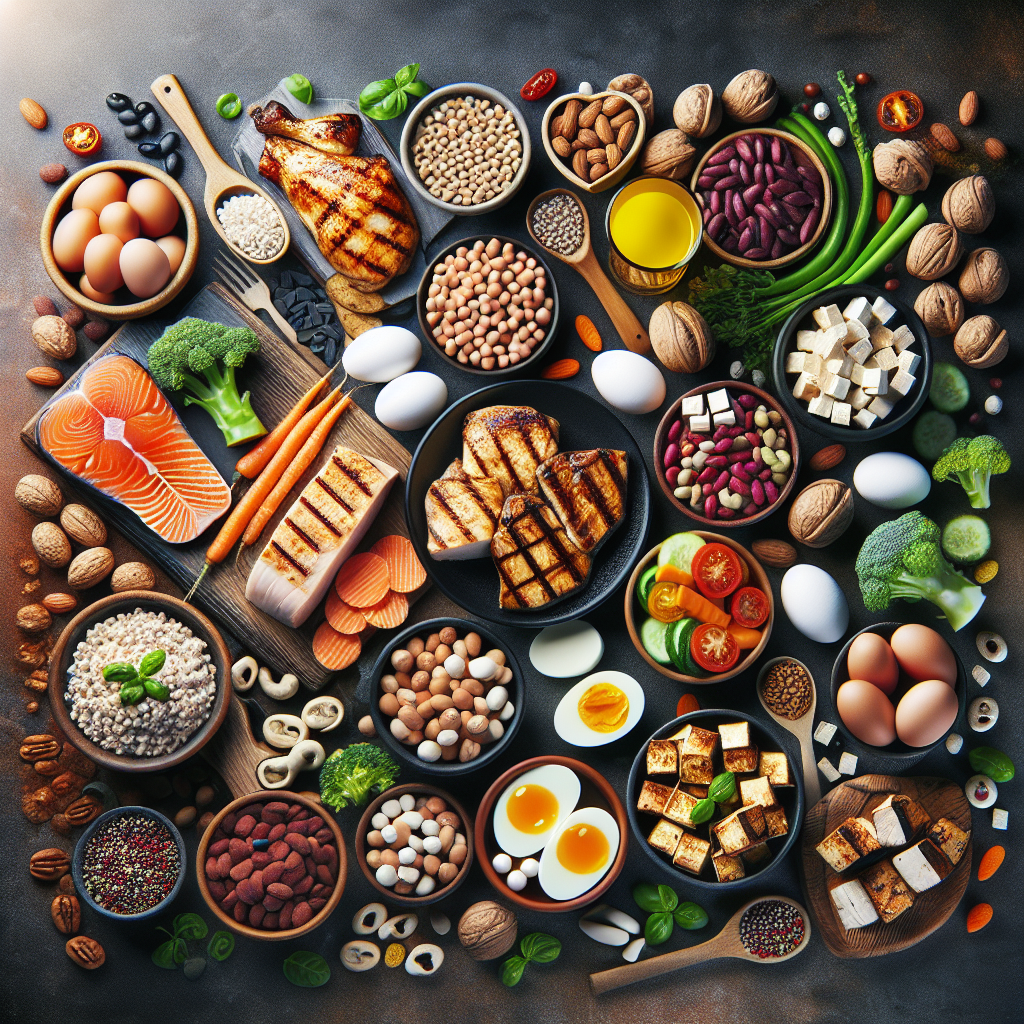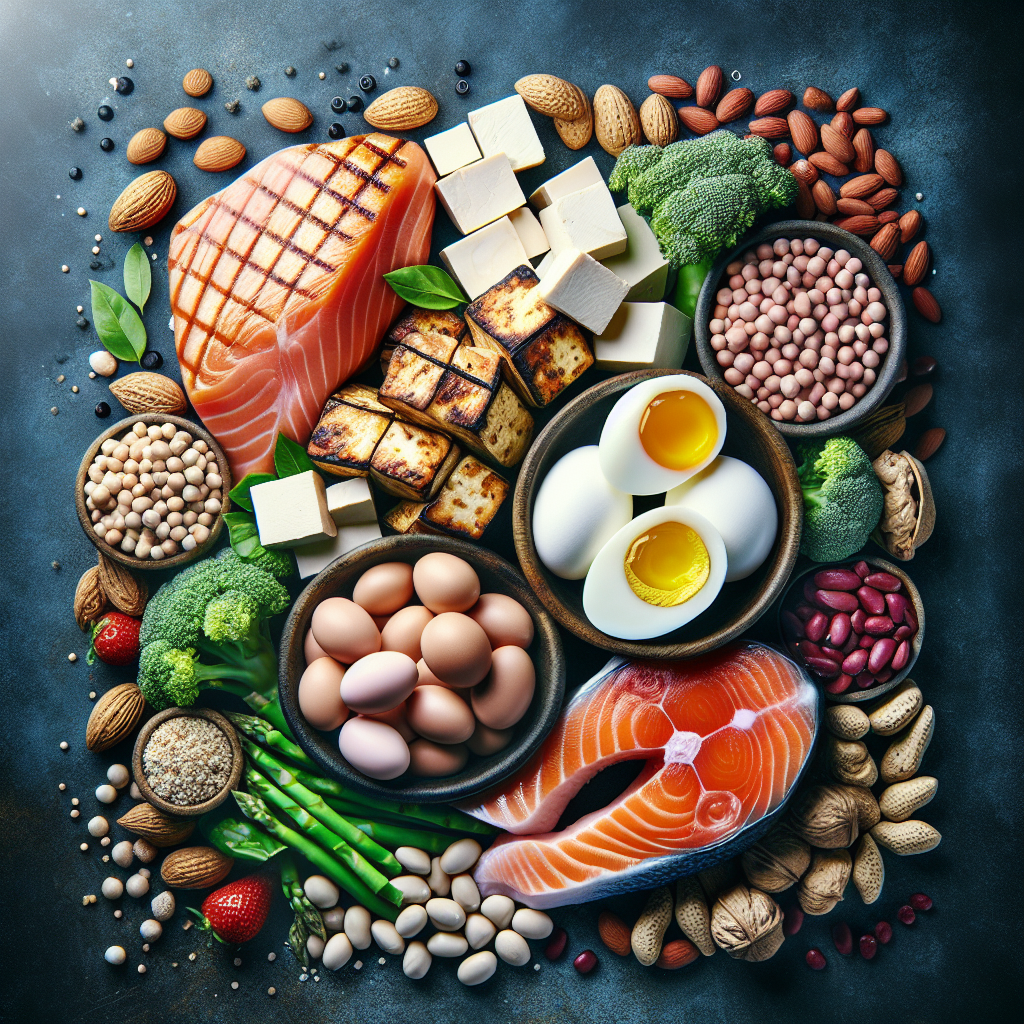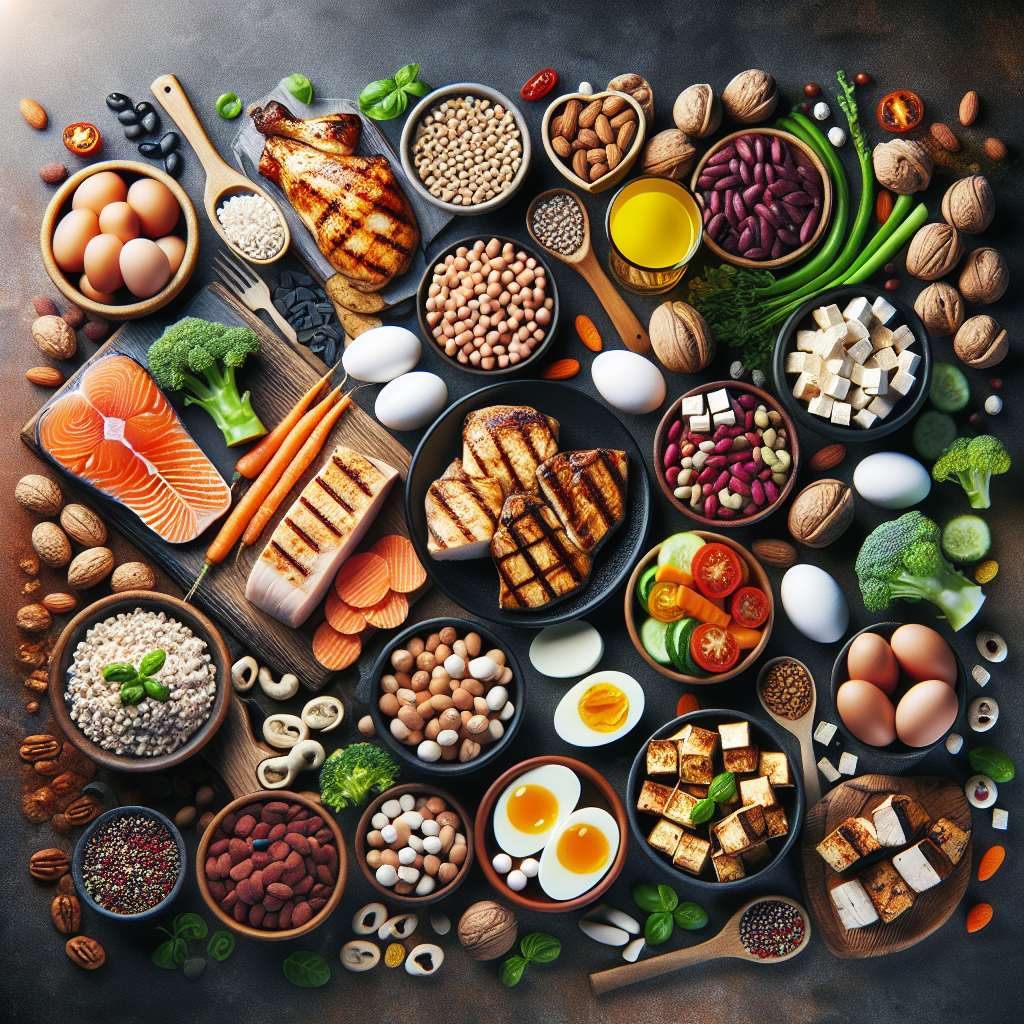Are you curious about the latest buzz surrounding high-protein diets? Well, look no further because this article has all the information you need. From understanding the benefits to debunking common myths, we will take you on a journey through the lowdown on high-protein diets. So, grab a cup of tea, sit back, and prepare to be enlightened!

Benefits of High-Protein Diets
Increased muscle mass and strength
One of the major benefits of high-protein diets is that they can help increase muscle mass and strength. When you consume an adequate amount of protein, it provides the necessary building blocks for muscle growth and repair. This is especially beneficial for those who are looking to increase their muscle mass or improve their athletic performance.
Improved weight management
Another advantage of high-protein diets is the improvement in weight management. When you consume a high-protein diet, it can increase feelings of fullness and reduce levels of hunger. This can help regulate your appetite and prevent overeating, leading to better weight control and potential weight loss.
Reduced cravings and hunger
One of the key reasons why high-protein diets are effective for weight management is their ability to reduce cravings and hunger. Protein is known to have a strong satiating effect, meaning it helps you feel fuller for longer periods of time. By including protein-rich foods in your meals and snacks, you can better control your appetite and reduce the temptation to indulge in unhealthy foods.
Improved bone health
High-protein diets can also contribute to improved bone health. Protein plays a vital role in the maintenance and repair of bones, and a diet rich in protein can help reduce the risk of osteoporosis and other bone-related conditions. Additionally, high-protein diets often include foods that are rich in calcium, a nutrient essential for strong and healthy bones.
Types of High-Protein Diets
Atkins Diet
The Atkins Diet is a popular high-protein diet that focuses on reducing carbohydrate intake and replacing it with protein-rich foods. The diet consists of four phases, with each phase gradually reintroducing carbohydrates while still maintaining a higher protein intake. The Atkins Diet emphasizes foods like lean meats, fish, eggs, and low-carb vegetables.
Zone Diet
The Zone Diet is another high-protein diet that focuses on balancing macronutrients to achieve a specific ratio of proteins, carbohydrates, and fats. The diet promotes the consumption of lean proteins, fruits and vegetables, and healthy fats, while limiting refined carbohydrates and sugary foods. The Zone Diet aims to regulate hormone levels and stabilize blood sugar levels to promote weight loss and overall health.
Dukan Diet
The Dukan Diet is a high-protein, low-carbohydrate diet that is divided into four phases. The first phase, known as the “Attack” phase, is extremely high in protein and aims to jumpstart weight loss. The subsequent phases gradually introduce more variety into the diet, while still emphasizing high-protein foods. The Dukan Diet is known for its strict rules and focus on lean proteins, such as chicken, turkey, and seafood.
The Paleo Diet
The Paleo Diet, also known as the Caveman Diet, is a high-protein diet that aims to emulate the eating habits of early humans. The diet focuses on consuming lean meats, fish, fruits, vegetables, nuts, and seeds, while avoiding processed foods, grains, dairy, and legumes. The Paleo Diet is often praised for its emphasis on whole, unprocessed foods and its potential health benefits.
How High-Protein Diets Work
Increased thermogenesis
One way high-protein diets work is by increasing thermogenesis, which is the process by which your body generates heat and burns calories. Protein has a higher thermic effect compared to carbohydrates or fats, meaning that it requires more energy to digest and absorb. This increased energy expenditure can contribute to a higher overall calorie burn and potentially aid in weight loss.
Thermic effect of food
The thermic effect of food refers to the energy expenditure required to digest, absorb, and process nutrients from the food you eat. Protein has a higher thermic effect compared to other macronutrients, with about 20-30% of the calories from protein being used during digestion. This means that you can burn more calories simply by consuming protein-rich foods.
Appetite suppression
High-protein diets have been found to have a strong satiating effect, which means they help you feel fuller for longer periods of time. This can be attributed to various factors, such as the slow digestion of protein, the release of appetite-regulating hormones, and the increased production of satiety signals to the brain. The result is a decreased desire to eat and reduced instances of overeating or snacking on unhealthy foods.
Preservation of lean muscle mass
When you consume a high-protein diet, it helps to preserve lean muscle mass. Protein is essential for muscle growth and repair, and consuming an adequate amount can help prevent muscle breakdown. This is particularly important for individuals who are trying to lose weight, as it can help preserve muscle mass while reducing body fat.
Potential Risks and Side Effects
Kidney problems
One potential risk of high-protein diets is the strain they can put on the kidneys. When you consume large amounts of protein, it can increase the workload on the kidneys as they are responsible for filtering and excreting waste products. While this is typically not an issue for healthy individuals, those with pre-existing kidney problems should exercise caution and consult with a healthcare professional before starting a high-protein diet.
Digestive issues
Some individuals may experience digestive issues when following a high-protein diet. This can include symptoms such as bloating, gas, constipation, or diarrhea. These issues may be due to the increased intake of certain protein-rich foods, such as beans or dairy products, which some people may have difficulty digesting. It is important to listen to your body and make adjustments as needed, such as choosing alternative protein sources or incorporating digestive enzymes.
Increased risk of heart disease
Certain high-protein diets that are high in saturated fats, such as the Atkins Diet, may increase the risk of heart disease. It is important to choose lean sources of protein and incorporate heart-healthy fats, such as omega-3 fatty acids found in fish and nuts, into your diet. Additionally, it is always recommended to consult with a healthcare professional before starting any diet, especially if you have pre-existing heart conditions.
Nutrient deficiencies
Depending on the specific high-protein diet followed, there is a potential risk for nutrient deficiencies. Some high-protein diets may limit or eliminate certain food groups, such as grains or dairy, which can lead to a lack of essential nutrients like fiber or calcium. It is important to ensure that your diet is well-balanced and includes a variety of food groups to meet your nutritional needs.

Choosing the Right Sources of Protein
Lean meats and poultry
When choosing sources of protein for your high-protein diet, opt for lean meats and poultry. These include options such as skinless chicken breast, turkey breast, lean cuts of beef, and pork tenderloin. These protein sources are low in saturated fats and provide a good amount of protein per serving.
Fish and seafood
Fish and seafood are excellent sources of protein and also provide additional health benefits. Options like salmon, tuna, trout, and shrimp are rich in omega-3 fatty acids, which can help reduce inflammation and promote heart health. Aim to include fish and seafood in your high-protein diet at least two to three times per week.
Eggs and dairy products
Eggs and dairy products are versatile protein sources that can be easily incorporated into meals and snacks. Eggs are not only high in protein but also provide essential vitamins and minerals. Include options like eggs, Greek yogurt, cottage cheese, and low-fat milk in your high-protein diet to boost your overall protein intake.
Plant-based protein sources
For those following a vegetarian or vegan high-protein diet, there are plenty of plant-based protein sources available. Legumes, such as beans, lentils, and chickpeas, are excellent sources of protein and also provide dietary fiber. Other plant-based protein sources include tofu, tempeh, edamame, quinoa, chia seeds, and hemp seeds. These options can be used in a variety of dishes and help meet your protein needs.
Recommended Protein Intake
RDA guidelines
The Recommended Daily Allowance (RDA) for protein intake varies based on age, sex, and activity level. On average, adult men and women are recommended to consume 0.8 grams of protein per kilogram of body weight per day. However, this may not be sufficient for those following high-protein diets or individuals who are physically active.
Protein needs for athletes
Athletes and individuals who engage in regular exercise often have higher protein needs to support muscle repair and growth. It is recommended that athletes consume 1.2-2.0 grams of protein per kilogram of body weight per day. This can vary depending on the intensity and duration of their training, as well as their specific goals.
Protein needs for vegetarians and vegans
Vegetarians and vegans can meet their protein needs through plant-based protein sources. It is important for them to ensure they are consuming a variety of protein-rich foods to obtain all the essential amino acids. Vegetarians and vegans may require slightly higher protein intake compared to their omnivorous counterparts to compensate for lower bioavailability of plant-based proteins.
Adjusting protein intake based on goals
Individuals who are looking to lose weight or gain muscle mass may need to adjust their protein intake accordingly. Those aiming for weight loss can benefit from consuming a higher protein intake to boost feelings of fullness and support muscle preservation. On the other hand, individuals looking to build muscle may benefit from consuming a higher protein intake to support muscle growth and repair.
Combining High-Protein Diets with Other Nutrients
Balancing macronutrients
While a high-protein diet is beneficial, it is important to also balance your intake of other macronutrients, such as carbohydrates and fats. Aim to incorporate a variety of nutrient-dense foods into your diet to ensure you are receiving a well-rounded intake of vitamins, minerals, and antioxidants. This can include whole grains, fruits, vegetables, and healthy fats.
Choosing healthy fats
In addition to protein, it is important to include healthy fats in your high-protein diet. Healthy fats, such as those found in avocados, nuts, seeds, and olive oil, provide essential fatty acids and can help improve heart health. Including these fats in your diet can also enhance the flavor and satisfaction of your meals.
Including complex carbohydrates
While high in protein, it is still important to include complex carbohydrates in your diet. Complex carbohydrates, such as whole grains, legumes, and starchy vegetables, provide a steady release of energy and are important for overall health and wellbeing. They also provide dietary fiber, which aids in digestion and helps with satiety.
Hydration and protein synthesis
Staying hydrated is important when following a high-protein diet. Adequate hydration is necessary for optimal protein synthesis, muscle recovery, and overall functioning of your body. Aim to drink plenty of water throughout the day and monitor your fluid intake, especially during periods of increased physical activity.
Tips for a Successful High-Protein Diet
Meal planning and preparation
One of the keys to a successful high-protein diet is planning and preparing your meals in advance. This can help ensure that you have protein-rich options readily available and save time during busy weekdays. Consider batch cooking proteins, such as chicken or tofu, and having pre-cut vegetables on hand to make meal preparation quick and convenient.
Monitoring portion sizes
While protein is important, it is essential to monitor portion sizes to avoid excessive calorie intake. Look at serving sizes and aim to include a palm-sized portion of protein in each meal. Additionally, be mindful of the preparation methods used, as frying or breading protein sources can add unnecessary calories and unhealthy fats.
Supplementing protein intake
In some cases, individuals may find it challenging to meet their protein needs solely through food. In these instances, protein supplements can be a convenient option. Whey protein powder, for example, can be easily added to smoothies or mixed with water for a quick protein boost. However, it is important to choose high-quality protein supplements and consult with a healthcare professional if necessary.
Staying hydrated
Protein metabolism requires water, so it is important to stay adequately hydrated when following a high-protein diet. Aim to drink at least 8 cups (64 ounces) of water per day, more if you are physically active or in a hot climate. Additionally, consider hydrating foods like fruits and vegetables, which can contribute to your overall fluid intake.
Common Misconceptions about High-Protein Diets
All protein is the same
One common misconception about high-protein diets is that all protein is the same. However, different protein sources vary in their amino acid profiles and bioavailability. Animal-based proteins, such as meat, poultry, and dairy, are considered complete proteins as they provide all the essential amino acids. Plant-based proteins, on the other hand, may be lacking in some essential amino acids, so it is important for vegetarians and vegans to consume a variety of plant-based protein sources to obtain all the necessary amino acids.
High-protein diets are only for bodybuilders
Another misconception is that high-protein diets are only suitable for bodybuilders or individuals looking to build muscle. While protein is vital for muscle growth and repair, it is also important for overall health and various bodily functions. High-protein diets can benefit individuals of all ages and activity levels by supporting weight management, preserving lean muscle mass, and providing essential nutrients.
High-protein diets are unhealthy
Some people may believe that high-protein diets are unhealthy due to concerns about potential risks and side effects. However, when followed properly and with consideration for individual needs and health conditions, high-protein diets can be safe and effective. It is important to choose lean sources of protein, balance macronutrients, and monitor overall nutrient intake to ensure a well-rounded and healthy diet.
High-protein diets can cause kidney damage
One of the biggest concerns regarding high-protein diets is the potential for kidney damage. While excessive protein intake may put increased strain on the kidneys, studies have shown that high-protein diets do not pose a significant risk to individuals with healthy kidneys. However, those with pre-existing kidney problems should exercise caution and consult with a healthcare professional before starting a high-protein diet.
Conclusion
High-protein diets offer a range of benefits, including increased muscle mass and strength, improved weight management, reduced cravings and hunger, and improved bone health. There are various types of high-protein diets to choose from, such as the Atkins Diet, Zone Diet, Dukan Diet, and the Paleo Diet. These diets work by increasing thermogenesis, the thermic effect of food, appetite suppression, and the preservation of lean muscle mass.
While high-protein diets have many advantages, it is important to be aware of potential risks and side effects, such as kidney problems, digestive issues, an increased risk of heart disease, and nutrient deficiencies. It is crucial to choose the right sources of protein, including lean meats, fish, eggs, dairy products, and plant-based protein sources.
Recommended protein intake varies based on factors like age, sex, activity level, and specific goals. It is important to balance macronutrients, choose healthy fats, include complex carbohydrates, and stay hydrated when following a high-protein diet. Additional tips for success include meal planning and preparation, monitoring portion sizes, supplementing protein intake if necessary, and staying hydrated.
Common misconceptions about high-protein diets include thinking that all protein is the same, that these diets are only for bodybuilders, that they are unhealthy, and that they can cause kidney damage. When followed properly and with consideration for individual needs, high-protein diets can be safe and effective for overall health and wellbeing. As always, it is recommended to consult with a healthcare professional before making any significant changes to your diet or lifestyle.

